Roland Kim’s five-stage empathy model has significant explanatory power in understanding self-control as empathy with one’s future self. By examining the development of empathy through these stages, we can better understand how individuals can cultivate self-control and make healthier life choices. Here’s a detailed explanation:
Roland Kim’s Five-Stage Empathy Model and Self-Control
Coming Soon: Advanced Empathy Skill Training Course!
Stage 1: Identification / Instant Fusion / Caring / Imitating
-
- Relevance: At this initial stage, empathy is instinctual and immediate. When individuals identify with their immediate needs and feelings, they begin to recognize the importance of self-care. This stage is crucial for basic self-control practices, such as eating when hungry or sleeping when tired.
- Application: By recognizing and responding to immediate needs, individuals lay the foundation for more complex empathetic understanding. For example, acknowledging that skipping meals due to stress is harmful can prompt better immediate self-care.
Stage 2: Pity / Mirroring / Copying / Admiring
- Relevance: This stage involves a deeper emotional connection, where individuals start to mirror and reflect on emotional states. When directed inward, individuals begin to consider the future implications of their current behaviors.
- Application: Pitying the future self for potential suffering due to poor habits can drive initial attempts at change. For instance, feeling bad about potential health issues from a poor diet might motivate someone to start making healthier food choices.
Stage 3: Sympathy / Sacrifice / Thoughtfulness
- Relevance: Sympathy involves making sacrifices for others. In the context of self-control, it translates to making thoughtful sacrifices for the benefit of one’s future self.
- Application: Individuals might forego immediate pleasures, such as unhealthy foods or excessive screen time, because they sympathize with their future selves who would suffer the consequences. This stage is critical for developing consistent self-discipline and making conscious lifestyle changes.
Stage 4: Objective / Unbiased Assessment / Respect
- Relevance: This stage is characterized by rational and objective empathy. Individuals evaluate their actions impartially and respect the needs and feelings of their future selves.
- Application: Making informed and balanced decisions about diet, exercise, and other lifestyle choices demonstrates respect for the future self. For instance, objectively assessing the benefits of regular exercise leads to consistent physical activity and respecting the future self’s health needs.
Stage 5: Empathy
- Relevance: Full empathy involves a deep and comprehensive understanding of others’ feelings. When applied to oneself, it means a complete and compassionate understanding of one’s future self.
- Application: Individuals make long-term healthy choices out of a profound empathy for their future well-being. They see their future self as deserving of health and happiness, which drives consistent and committed actions towards self-care.
Explanatory Power in Understanding Self-Control
- Understanding the Development of Self-Control:
- Kim’s model helps explain how self-control evolves from basic recognition of immediate needs to sophisticated, compassionate planning for the future. Each stage represents a deeper level of self-awareness and foresight.
- Identifying Barriers and Motivations:
- By identifying which stage an individual is at, we can understand their barriers to self-control and what might motivate them to progress. For example, someone in Stage 2 might need to develop deeper emotional connections with their future self to move to Stage 3.
- Cultivating Compassion for Self:
- Higher levels of empathy, as outlined in Kim’s model, emphasize the importance of compassion for oneself. This compassion is critical in overcoming addictive behaviors and making healthier choices. Understanding the emotional and physical challenges from a compassionate viewpoint fosters resilience and motivation.
- Holistic Approach to Self-Improvement:
- The model advocates for a holistic approach where emotional, psychological, and rational aspects are considered in self-control. This comprehensive understanding can guide individuals in making balanced and sustainable lifestyle changes.
Anecdotal Illustration
Anecdote: Sarah struggled with binge eating as a way to cope with stress. Initially, she only focused on immediate relief (Stage 1), eating to comfort herself without thinking about the long-term effects. As she began therapy, she started to pity her future self for potential health problems (Stage 2).
With guidance, Sarah began making sacrifices by choosing healthier foods and reducing binge episodes out of sympathy for her future self’s health (Stage 3). She then objectively assessed her eating habits, creating a balanced diet plan and respecting her body’s needs (Stage 4). Finally, Sarah developed a deep empathy for her future self, envisioning a healthier and happier version of herself. This empathy drove her to maintain a healthy lifestyle consistently (Stage 5).
Outcome: By progressing through these stages, Sarah transformed her relationship with food. Her journey illustrates how developing empathy for one’s future self can lead to effective self-control and healthier life choices.
Conclusion
Roland Kim’s five-stage empathy model provides significant explanatory power in understanding the development and application of self-control as empathy with one’s future self. By progressing through these stages, individuals can cultivate deeper compassion for their future well-being, leading to sustainable and healthy lifestyle changes.
Reference: Kim, R. (2021) The Five Stage Theory of Civilization: An Integrated Psychological and Psychoanalytic Theory of Personality Development.

